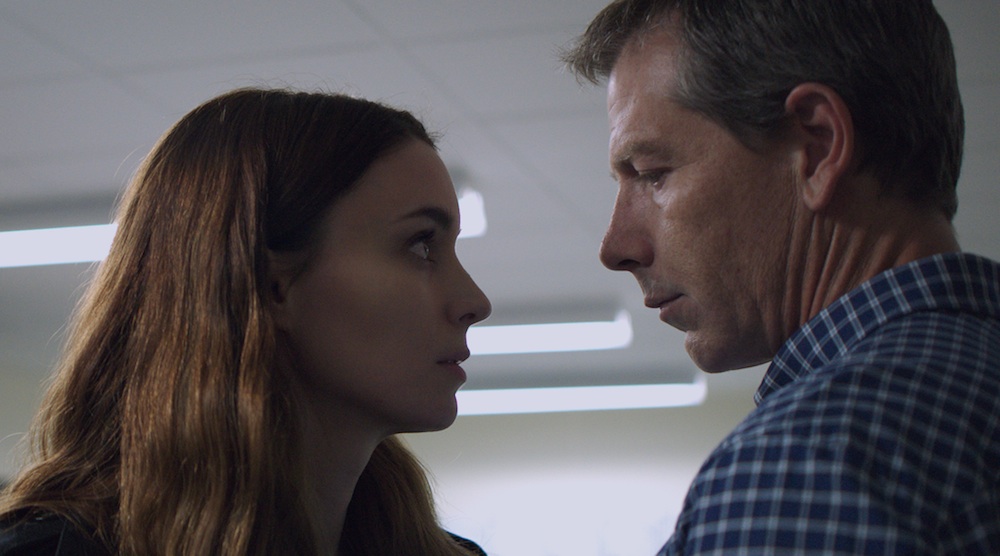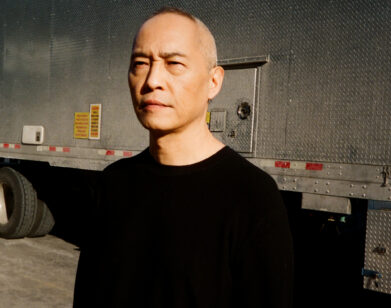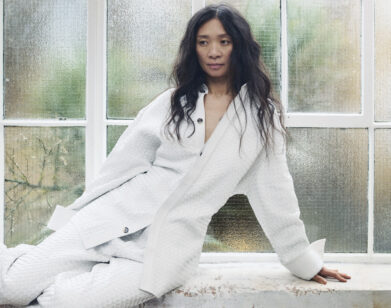Benedict Andrews, Stage and Screen

ROONEY MARA AND BEN MENDELSOHN IN UNA. PHOTO COURTESY OF TIFF.
Benedict Andrews always knew he wanted to make a film. Born and raised in Adelaide, Australia, and based in Reykjavik, Iceland, Andrews is a veteran stage director with an impressive global résumé. Over the last five years, for example, he’s helmed high-profile theater and opera productions in London, New York, Sydney, Amsterdam, Frankfurt, Berlin, and Copenhagen. His work attracts an enviable level of star power: Cate Blanchett, Isabelle Huppert, Gillian Anderson, Ben Foster, Elizabeth Debicki, and Vanessa Kirby have all starred in Andrews-directed plays.
When we meet Andrews at the Toronto International Film Festival, it is to discuss his first feature film, Una, starring Rooney Mara and Ben Mendelsohn. From an outsider’s perspective, Una seems like an obvious choice for Andrews: the script was adapted by David Harrower from his play Blackbird, which Andrews had previously directed onstage in Berlin in 2005. For Andrews, however, it was a little more surprising. “I would always say to people, ‘When I make a film, it’s not going to come from theater. I’m not interested in making filmed theater,'” he says with a laugh.
The story of a young woman confronting the middle-aged man with whom she had a relationship when she was just 13, Blackbird has always been a divisive play. Under Andrews’ direction, however, Una probes an uncomfortable situation with careful compassion. Though as Una and Ray, Mara and Mendelsohn are certainly at the center of the film, Andrews’ fleshes out the action with a supporting cast featuring Riz Ahmed as Ray’s clueless coworker, Tobias Menzies as Ray’s boss, and Tara Fitzgerald as Una’s cancer-stricken mother.
“Deep down, I felt that I was drawing upon the well of my theater work with this very clear knowledge that I wasn’t trying to replicate what I was doing in the theater,” Andrews explains. “The inquiry into the human psyche, the ability to work with actors, the pleasure in challenging audiences and making strong pictures, and just the aesthetic kick I get out of making work … I felt like I was drawing on that,” he continues.
EMMA BROWN: What made you want to adapt Blackbird into a film?
BENEDICT ANDREWS: I’d been wanting to make a film for a very long time. With Blackbird, I had already directed a good production of the play, [and] it really haunted me for a long time. The two characters really got under my skin; I was still fascinated by them. The play is two people locked into a room, tearing shreds off each other with language in a verbal boxing match. That’s the space in the theater, too—we’re in the same room with the people. We have an uncomfortable closeness; we’re breathing the same air. We listen to them and the things they say cause us to feel emotions and see things. In the play, when they discuss the past, that happens on the screens of our imagination. I became fascinated that inside this great, great, great play—one of the best kind of two-handers ever written—a completely tense, massively packed, emotionally raw play, with all of that still in tact, there was a clue for me to make the transition from theater to cinema, which is the idea of time. There’s a space that cinema occupies that theater can’t, that’s very close to how our brains process memory—the screens in our imagination and how the cells of our bodies store memories that flash in front of us. It seemed to me that at its heart, this was what Blackbird could become as a cinema—a story of how memories from the past interrupt the present. Confronting him needs to take her into the past in order to work out what happened to her. She’s lost without that. That became a very enticing cinematic idea for me, a very energizing cinematic idea to explore the emotional experience of time and memory, and the scar tissue of this relationship. That was alongside them being very fascinated by their story and by the fundamental problem in their story, which of course is connected with the illegality of their relationship and their absolutely criminal relationship. In a way, the film is not a forensic study of a criminal relationship; it very intelligently takes all the many angles on that. Ultimately, at its emotional core is a relationship where, for her at least, is a question of love. We’re left to question if it’s even possible that they’re in love, given her age at the time, but the film doesn’t solve that for us, and that’s very troubling. That’s where it challenges us. Her problem in the film is, “Was I in love? Was this the great love affair of my life—I ran away with this man and I was going to change my life? Or was this what everybody else told me it was afterwards, that I was used up and damaged by him and abused by him?” And both positions are absolutely true and mixed up. This fault line inside somebody and inside their relationship, this fault line I think is this face of drama.
This is why we go to great cinema or great theater, to get to these limits. For instance, in Manchester by the Sea and in Moonlight, in completely different ways from each other and from this, they deal with people who great damage has happened to, who are trying to find ways to live. I think Una is another one of those. Sometimes we go to the cinema and it’s greatly comforting and it’s great fun for us, but we also go there to look into the things that trouble us in the world and in ourselves. In this, I guess we know what’s wrong in their relationship and our society is dealing with a very big problem in the abuse of children, and that needs to be something that we talk about in complex ways. This film activates that conversation and that continues after the cinema, but it’s not just a think piece about that, it’s about the emotionally raw experience of these two people, and it takes away our easy boundaries of good and bad, abuser and victim, and troubles us to keep thinking through it. I’ve had experiences after talking to people—one woman had seen it twice, and she had completely conflicting views of Ben at the end. What’s happening with that girl at the end? At first he’s a good father. The next time, no, something’s definitely going on. People ask me, “What do you think?” and I deliberately don’t know. [laughs] Both possibilities exist, and there are clues for both.
BROWN: When you talked to the playwright David Harrower, was he on board?
ANDREWS: Absolutely. There was already a draft. It had been around for a while. I jumped onto the project with producers Jean Doumanian and Patrick Daly, who had had the property for some time and had been developing it for some time. David had already made some very interesting and smart decisions about opening up the present, for instance—the trajectory towards the party, the wife, the coworker Scott. We both said to each other, “Okay, let’s start together. Let’s start afresh.” He was extremely open to not trying to hold onto doing a film version of the play. He knows great directors will continue to do his play and audiences will continue to go see that in the theater. It works, and it’s a great play. It had to become something else as cinema, and he was absolutely committed to that, and all my collaborators were. It’s a process of searching. For instance, in the play, they speak in a very fractured language and a fractured syntax. I think the first lines are, “Shock.” “So.” “Well.” We didn’t try and replicate that, because that’s really special in the theater, but maybe on film that would start to sound a bit stagey. In the theater, it’s extremely holy. I treated David’s score when I directed in the theater like jazz, like, “I want that pause to be here, that move to here.” That wasn’t my concern here with how they should they should sound, because the camera is doing something else. A lot of what happens in the film happens in silence. It happens in the flicker of their eyes, or the way a tear rolls down her cheek, or what can’t be said, or in what the film shows us when there’s one picture that we see while they’re saying something else, in terms of how memory works. He was absolutely an incredible, dynamic collaborator, completely open to us discovering it. It’s like they’re two children grown from the same DNA, but they become something else. That’s why I think the name change is also important, too. The name really leads us to her in a different way, and leads us through her journey, but it’s the name that obsessed him. He had the name Una on his mind for 15 years and he couldn’t mention it.
BROWN: I know you said that you purposefully left certain aspects of Una and Ray’s relationship undecided. Was that difficult? Did you think about how Una is going to end up?
ANDREWS: It’s part of the process, but the power of the filmmaking, like the power of the play, is to keep that balance on a knife-edge, and to not wrap it up in a nice, easy to swallow bow. That’s the difficult pleasure of the piece. Of course we think about what we’re showing and what that’s doing and we have choices. I think something very specific happens when he tries to kiss her again, and she turns away. I believe that at that point, the thread to the past is cut. I’m not saying it’s happily ever after, because that would be selling her short, but I believe that something has lifted. She’s faced some very uncomfortable spaces inside herself, and stared down things that she needed to stare down extremely bravely. So I don’t know what future she walks off into, and I don’t know what future he walks back to. I know a bomb is about to go off up there, but I don’t know what. The idea that the film continues when that black frame comes down at the end, that’s something that we definitely wanted to achieve.
BROWN: I know you grew up in Adelaide. Did you watch a lot of theater? Was there a lot of theater available?
ANDREWS: There was the Adelaide Festival there. There was a state theater company where good actors were putting on good theater, but as I grew up, I started to go to the Adelaide Festival. It was a truly great festival. When I was growing up, there were less festivals in the world. There was Avignon, there was Edinburgh, and there was Adelaide. I was 14 or something, going and seeing Japanese dancers covered in flowers with shaved heads hanging upside down. I remember when I was 16, I saw Peter Brooks’ The Mahabharata, an 12-hour piece staged outdoors in a quarry that began at dusk and ended just after dawn. My idea of theater was always something very lively and radical and not necessarily what the well-made theater of my hometown was. I was very privileged growing up there. I left there in my late twenties, so I stayed there for quite some time. I moved to Sydney and made a lot of work in the early part of my career in Sydney.
BROWN: When you were in Sydney, were you thinking, “At some point I’m going to make a film?”
ANDREWS: Yes, I always wanted to make a film. I studied cinema studies—theory of cinema—at university. I’ve always been obsessed with cinema, and I always thought it was something that I would do. It was a question of when. It took a lot longer than I thought, but not through really trying. I was attached to a couple of things, but somehow the theater project always took over, and I kept being offered wonderful theater opportunities, and a wonderful journey through theater with the work in London and Berlin and European opera houses. That was a continual challenge and evolution and adventure, but all the time I was like, “When am I going to make a film?” It was also a question of actually starting to activate people around me, activate various agencies and saying, “Alright, I’m in my forties now. Start feeding me scripts.” In the first email that had 10 titles was Blackbird.
BROWN: Amazing. And they didn’t know about your history with the play?
ANDREWS: I don’t think so; my agent didn’t know that I had inquired about the rights years before. I’m a great believer in magic and accidents coinciding with what you love. The timing ended up being absolutely right.
UNA RECENTLY SCREENED AT THE TELLURIDE FILM FESTIVAL AND THE TORONTO INTERNATIONAL FILM FESTIVAL. FOR MORE ON BENEDICT ANDREWS, VISIT HIS WEBSITE.






